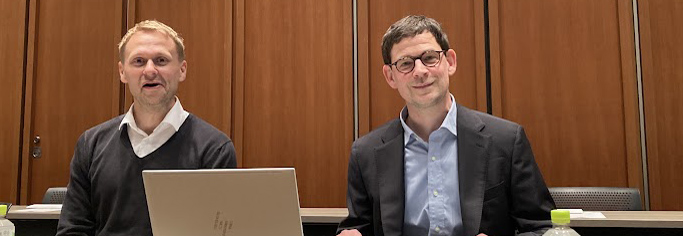
Meeting with Foreign Media Finn Mayer, the Süddeutsche Zeitung Dossier, Felix Lill, freelance journalist
June 11, 2025
Tokyo
As part of its initiatives to enhance the external communications of Japan’s business community, the Keizai Koho Center (KKC) organized a roundtable discussion in Tokyo with European journalists. The event welcomed eleven journalists from Germany, Austria, and Switzerland, including Mr. Finn Mayer, Editor-in-Chief for Geopolitical Economics at the Süddeutsche Zeitung Dossier, and Mr. Felix Lill, freelance journalist contributing to Die Zeit, among others. Twenty-seven participants from Japan attended, primarily public relations professionals engaged in global communications.
The session began with a keynote address by Mr. Mayer titled “De-risking Germany’s Supply Chain and Security Infrastructure: From the Perspective of U.S.–China Tensions.” This was followed by a panel discussion moderated by Mr. Lill, featuring nine emerging journalists who shared their perspectives on the evolving geopolitical landscape.
Transformation Brought About by Environmental Changes
Germany has long relied on three key international partnerships: trade with China, energy from Russia, and military cooperation with the United States. However, these relationships have undergone significant transformation in recent years. A 2019 report by the Federation of German Industries (BDI) highlighted growing concerns over economic dependence on China. While China previously imported German machinery to build its industrial base, it has since developed its own infrastructure, shifting the relationship from one of coexistence to direct competition. China’s tightening of rare earth export controls further underscores its increasingly assertive posture.
The invasion of Ukraine exposed the vulnerabilities of relying on Russian energy, turning a once strategic partner into a geopolitical risk. Simultaneously, confidence under the U.S. security framework has waned, prompting calls to counterbalance the dominance of American tech giants—particularly in areas such as operating systems.
Policy Challenges for Germany’s New Administration: De-risking of the Supply Chain
Chancellor Friedrich Merz, who assumed office in May, has acknowledged these shifting dynamics and initiated measures to mitigate associated risks. His administration has announced plans to invest €400 billion in infrastructure and significantly boost military spending. However, public support remains uncertain, and the path to revitalizing domestic industries is expected to be long and costly.
Historically, German political leadership has refrained from direct economic intervention. Yet the current risks to supply chains are no longer purely economic—they are deeply political. This shift is compelling policymakers to reconsider long-standing principles and make difficult strategic decisions.
Germany’s Expectations and Interest in Japan
Japan stands out as one of the few countries capable of producing high-quality precision parts, with a reputation for high quality and reliability. While Japan and Germany have long competed in industrial sectors, they also share common values and have cultivated a rules-based, cooperative relationship. In recent years, Japanese culture and tourism have gained popularity in Europe, sparking a renewed wave of “Japonism” in design and aesthetics. Germany is increasingly interested in deepening its ties with Japan across a wide range of sectors in the future.
